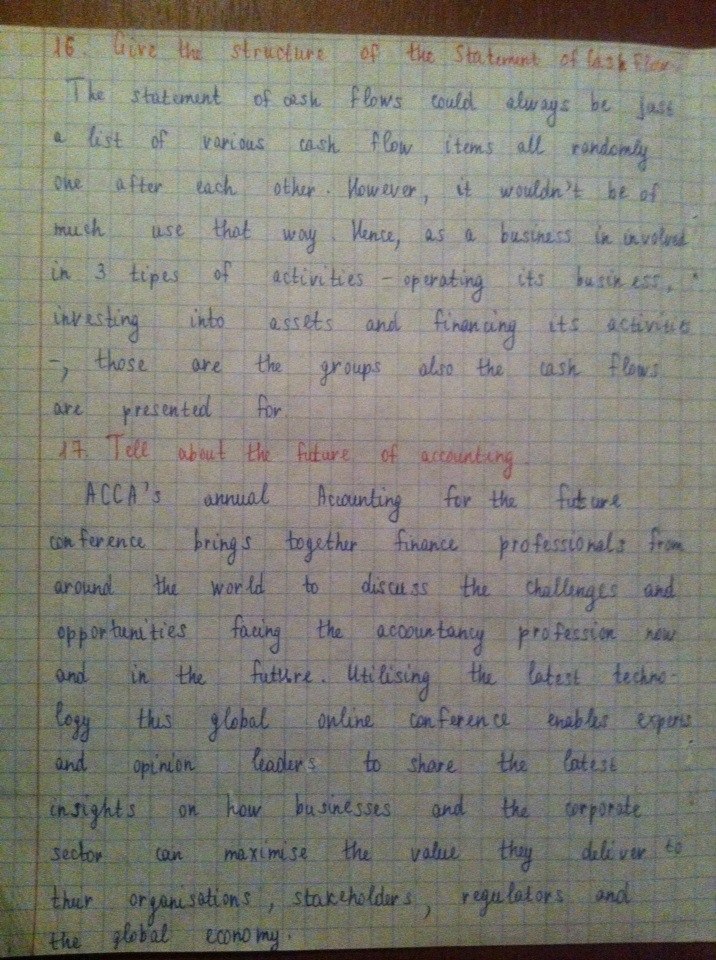
- •1)Describe the different types of job in accounting
- •Tell about the International Accounting
- •International accounting
- •Give the definitions of four basic principles of accounting: the matching principle, the going concern principle
- •Describe the meanings of debt, liabilities and shareholder
- •6.Tell about Chartered Accountant.
- •Describe the structure of the Statement of Financial Position.
- •8. Describe the structure of Statement of Earning.
- •Describe some types of tax: income, property, value added, corporate.
- •What provision for income tax and deferred income tax balances mean?
- •21.Describe the main assumptions used by accountants.
- •22.Describe the most important accounting principles.
- •2. Monetary Unit Assumption
- •23.Give the definitions of four basic principles of accounting: the prudence principle and the consistency principle.
- •24. Give definitions of following words: to impose tax, to increase tax.
- •25. Give definitions of following words: tax evasion, tax exempt
- •35. Мы не проходили
- •42. Definition of 'Gross Profit Margin'
- •Definition of 'Earnings Per Share - eps'
- •The formula[edit]
- •Inventory turnover
- •45. Describe the following methods of depreciation: straight line, declining balance
- •46. Describe the following methods of depreciation: unit of production, hours of use.
- •Time Depreciation (hours of use) Formulas
- •47. Describe the following methods of depreciation: sum of-the-years digits. Sum of the Years' Digits Method of Depreciation
What provision for income tax and deferred income tax balances mean?
In a financial statement or personal budget, an estimate for one's total income tax liability for a given year. This is especially important when the government or an employer does not automatically deduct estimated tax payments from paychecks or other revenue. Generally speaking, one must set the provision for income taxes aside and pay it quarterly or annually.
A liability recorded on the balance sheet that results from income already earned and recognized for accounting, but not tax, purposes. Also, differences between tax laws and accounting methods can result in a temporary difference in the amount of income tax payable by a company. This difference is recorded as deferred tax.


21.Describe the main assumptions used by accountants.
Accounting accountants
Accounting have established group of assumptions, those assumptions are the basics of financial accounting. At the same time, assumptions are not accounting principles, as they are more of agreed upon rules.
Assumptions:
The Economic(Business) Entity Concept
The Monetary unit assumption
The Going concern(Continuing Concern) Concept
The Time Period Concept
The Economic(Business) Entity Concept : as the name indicated, The accountant keeps all of the business transactions of a sole proprietorship separate from the business owner's personal transactions. For legal purposes, a sole proprietorship and its owner are considered to be one entity, but for accounting purposes they are considered to be two separate entities.
Monetary unit assumption: meaning that the business should have one money unit to record its transactions, for example U.S. dollar.
Going concern assumption: meaning that the business is going to be operated for non predefined period, in other words, there is no ending date for business life.This accounting principle requires companies to use the accrual basis of accounting. The matching principle requires that expenses be matched with revenuesTime period assumption: This accounting principle assumes that it is possible to report the complex and ongoing activities of a business in relatively short, distinct time intervals such as the five months ended May 31, 2012, or the 5 weeks ended May 1, 2012. The shorter the time interval, the more likely the need for the accountant to estimate amounts relevant to that period.
22.Describe the most important accounting principles.
1. Economic Entity Assumption The accountant keeps all of the business transactions of a sole proprietorship separate from the business owner's personal transactions. For legal purposes, a sole proprietorship and its owner are considered to be one entity, but for accounting purposes they are considered to be two separate entities.
2. Monetary Unit Assumption
Economic activity is measured in U.S. dollars, and only transactions that can be expressed in U.S. dollars are recorded.Because of this basic accounting principle, it is assumed that the dollar's purchasing power has not changed over time. As a result accountants ignore the effect of inflation on recorded amounts. For example, dollars from a 1960 transaction are combined (or shown) with dollars from a 2013 transaction.
3. Time Period Assumption This accounting principle assumes that it is possible to report the complex and ongoing activities of a business in relatively short, distinct time intervals such as the five months ended May 31, 2013, or the 5 weeks ended May 1, 2013. The shorter the time interval, the more likely the need for the accountant to estimate amounts relevant to that period.
4. Cost Principle From an accountant's point of view, the term "cost" refers to the amount spent (cash or the cash equivalent) when an item was originally obtained, whether that purchase happened last year or thirty years ago. For this reason, the amounts shown on financial statements are referred to as historical cost amounts.
5. Full Disclosure Principle If certain information is important to an investor or lender using the financial statements, that information should be disclosed within the statement or in the notes to the statement. It is because of this basic accounting principle that numerous pages of "footnotes" are often attached to financial statements.
6. Going Concern Principle This accounting principle assumes that a company will continue to exist long enough to carry out its objectives and commitments and will not liquidate in the foreseeable future. If the company's financial situation is such that the accountant believes the company will not be able to continue on, the accountant is required to disclose this assessment.The going concern principle allows the company to defer some of its prepaid expenses until future accounting periods.
7. Matching Principle This accounting principle requires companies to use the accrual basis of accounting. The matching principle requires that expenses be matched with revenues.
8. Revenue Recognition Principle Under the accrual basis of accounting (as opposed to the cash basis of accounting), revenues are recognized as soon as a product has been sold or a service has been performed, regardless of when the money is actually received. Under this basic accounting principle, a company could earn and report $20,000 of revenue in its first month of operation but receive $0 in actual cash in that month.
9. Materiality Because of this basic accounting principle or guideline, an accountant might be allowed to violate another accounting principle if an amount is insignificant. Professional judgement is needed to decide whether an amount is insignificant or immaterial.
10. Conservatism If a situation arises where there are two acceptable alternatives for reporting an item, conservatism directs the accountant to choose the alternative that will result in less net income and/or less asset amount. Conservatism helps the accountant to "break a tie." It does not direct accountants to be conservative. Accountants are expected to be unbiased and objective.
